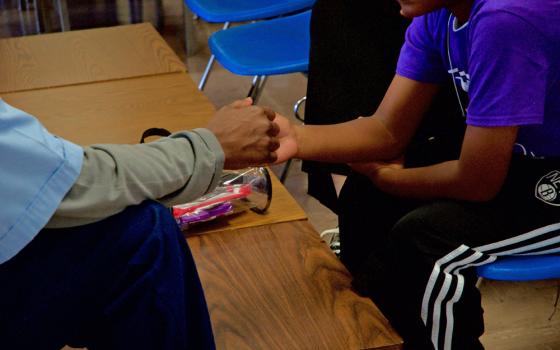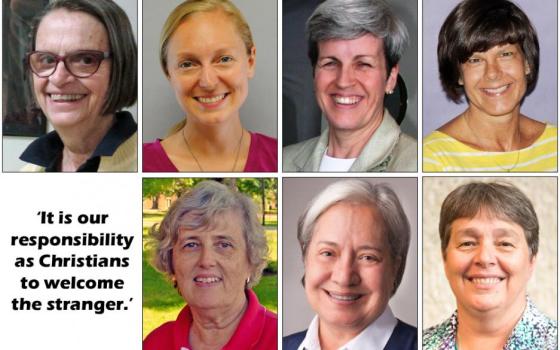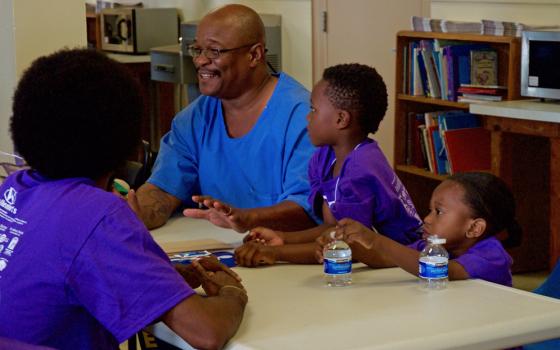When most people hear the term "prison tattoo," they don't think about hearts and rainbows. But on a recent Friday morning in the visitation room at San Quentin State Prison, that's exactly the kind of ink prisoners were getting.
One inmate, dressed in telltale blue shirt and slacks, held out his forearm as a woman at a face-paint station used a small paintbrush to apply a candy-apple red heart. Next to him stood his son, who instructed the woman to paint his initials in green inside the heart.
Across the room, another prisoner sat at a table with his forehead, cheeks and chin covered in a constellation of shiny stick-on stars, rainbows and cartoon animals, courtesy of his young daughter, who sat on his lap. It was a Father's Day celebration, and the normally bare-bones visitation room had been transformed into a bright and celebratory place, full of laughter, smiles, snacks and songs. Another inmate bounced his infant son on his knee, singing "Oh Happy Day."
The event was put on by the Center for Restorative Justice Works, a California-based grassroots organization dedicated to connecting families impacted by the criminal justice system. The center's Get on the Bus program offers children of incarcerated parents the opportunity to travel to visit their parents for Mother's and Father's Day.
For almost all of the 1,000 children who participate in the program annually, it's the only time of the year they see their incarcerated parent. For many, Get on the Bus provides the opportunity to meet their parent for the very first time.
Started by Los Angeles-based St. Joseph of Carondelet Sr. Suzanne Jabro in 1999, Get on the Bus provides free transportation for inmates' children and spouses, as well as meals, snacks, and for the children a teddy bear and a letter from their parent. Volunteers provide counseling and, when necessary, help facilitate conversations between inmates and their children.
The program was born out of the need to assist families with an incarcerated parent living far away from home. That's an all-too-common occurrence in a state as big as California, where prisoners are commonly sent more than four hours away from their families, making visiting often impossible.
Many children of incarcerated parents live with their grandparents, Jabro said.
The grandparents "are doing the best they can, but they may not have a car that's safe enough, and they could never make a four-and-a-half hour overnight drive, visit in the prison for four or five hours, and then get back in the car and drive back home," Jabro said. "They often can't afford to spend the night in a hotel, pay for gas and food. Even water's $2 in prison, in the machines."
Anthony, a San Quentin inmate who only sees his 32-year-old daughter and his infant granddaughter once a year through Get on the Bus, said without the program's assistance, the trip could easily cost his daughter, who lives in Compton, $400 or $500, factoring in time and travel expenses. To get to San Quentin, many were picked up in the Los Angeles area at 10 p.m. or 11 p.m. and rode the bus through the night.
Jabro, who has worked in prisons in various capacities for more than 40 years, said an increase in the number of women in prison during the 1990s prompted the leadership teams of various religious orders to form a delegation committed to identifying ways to help that population. They spoke with several incarcerated women, who all said the same thing.
"The only thing the women asked us to do was to help them see their children. 'We never see our children,' they said, 'Help us. Help us.' You couldn't be in the midst of that much sorrow and not attend," Jabro said.
To make the program come to life, it was necessary to take full advantage of the "nun connection," Jabro said. "We called nuns we knew in San Bernardino, San Diego, all over the state, and we would ask if they could go visit a family and bring them to the bus, which was in Los Angeles. It was a real network. That's just how nuns do it."
Get on the Bus still gets many of its volunteers through a faith network — leaders from churches of various faiths make announcements to let congregations know the program needs volunteers.
"I'm very pleased at how generous the Catholic community and all the communities of faithful are," Jabro said. "We work with Jewish and Protestant churches. Everybody mixes in and we're all in it together."
The program was also funded entirely by women religious for the first few years. (Now it receives some funding from secular community donations, as well.)
"Because of the network between women religious throughout the state, because we knew each other and were in relationship, we knew that other nuns' orders would say yes when we needed to fund the buses," Jabro said. That also gave them extra credibility with those they were serving. "We were able to say, 'This is run by people who get it and people who are poor.' "
During the program's first year in 1999, Get on the Bus brought 17 children to see their mothers at Valley State Prison in Chowchilla, California. As the program expanded, the sisters realized the need to serve men's prisons, as well.
"Children need both their mother and father," Jabro said. The connection helps children feel supported and better rooted in both their families and themselves. "Children need to see themselves reflected in their parents — their eyes, their features," she added.
Additionally, she said, parents can help steer their children away from crime. "You often see dads talking to their sons: 'Do not follow me. Do not follow me.' "
In a 2013 study conducted by the Center for Restorative Justice Works, 40 percent of fathers reported that they would never see their children without Get on the Bus.
Visitation from children and spouses has been proven in study after study to reduce recidivism. Visits often increase prisoners' chances of finding housing and employment after being released, as well.
Furthermore, the Center for Restorative Justice Works points out on its website that children's odds of delinquency decrease when they are able to visit their parents in prison.
Women religious have a history of working to help the incarcerated. St. Joseph Sr. Elaine Roulet more than 25 years ago was instrumental in setting up and later served as director of a children's center at Bedford Hills Correctional Facility in Westchester County, New York. The center offers parenting classes for female inmates and a safe environment for them to visit with their children.
Being in prison is a horrifying experience that would test anyone. "The Gospel is so radical when you're sitting in a prison chapel," Jabro said. "It's just stark."
Anthony, the inmate whose daughter traveled from Compton with Get on the Bus, said even though he only sees his daughter once every 365 days, he spends all year looking forward to it. "It keeps me positive," he said.
Being involved in Get on the Bus is rewarding for the volunteers as well as for the prisoners and children. Mary Guerrero, a volunteer who came up from Santa Ana on an overnight ride, said when she learned about Get on the Bus from her church, she knew she had to volunteer. Both her sons, now ages 26 and 30, spent some time in prison in their early 20s. She said the experience woke her up, forcing her to confront both her pre-existing judgments about prisoners and their families as well as the huge responsibility of parents.
Inside San Quentin, away from the visiting room and the energy of the Get on the Bus event, another inmate tended the garden — part of his daily work, for which he makes 30 cents an hour. Now in his 50s, he has been in prison on a drug and theft charge for more than two decades. He has been on suicide watch eight times.
He said he has a daughter would be 26 this year, but he hasn't heard from her since she was 5 years old — he was already incarcerated then, and his wife filed for divorce and denied him contact with their daughter.
"In here, you never forget that you're in prison," he said. "I believe in God, I do. But this — this stretches my faith."
He said, "Every year at this time, I think, maybe this will be the year I'll get a card from my daughter."
[Georgia Perry is a freelance writer based in Oakland, California. She's contributed to several print and online magazines, including The Atlantic, CityLab, Portland Monthly Magazine and the Portland Mercury. She was formerly a staff writer at the Santa Cruz Weekly in California. Follow her on Twitter: @georguhperry.]



